To borrow (most of) a phrase from the ever-entertaining political pundit James Carville, “it’s about the [customer], stupid!” In the original quote, he said “economy” instead of “customer” when he was a top strategist for Bill Clinton’s first presidential campaign. Then-Governor Clinton heeded Carville’s advice, focused his message strategy on the underperforming economy and prevailed over an incumbent president — a historically tough task.
Within the last couple of months, IBM released a report drawn from a massive collection of CxO interviews — more than 4,000 to be exact. IBM asked these C-suite executives a bevy of questions about the influence of technology, customer interaction, etc. and how the executives predict those factors will impact their respective businesses moving forward. The two most cited factors to watch moving forward are, not surprisingly, the growing influence from customers on business strategy decisions because of improved feedback mechanisms, and the impact of new technologies.
I culled through the 32-page IBM report to pull the best graphics and provide a little context for you to use in your decision-making. You might already be on board with all these thought processes, in which case it’ll be nice to know you’re already on the right path. If you find that other CxOs have a different perspective than you, maybe this can provide some valuable information on how you might rethink your business strategies moving forward.
Technology will change the game
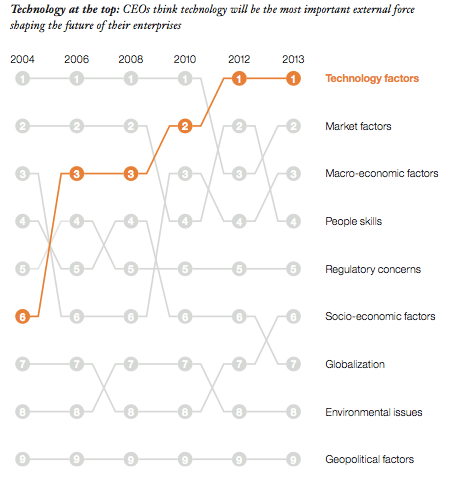
CEOs believe technology will be the most important external force shaping the future of their enterprise. The rise from the sixth most important factor in 2004 to the first in 2013 shows the speed of this change. Not every single CxO agrees with the CEO, but no CxO had technology outside the top three:
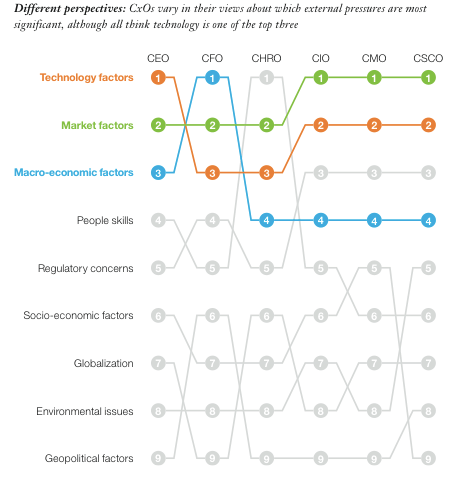
Likewise, certain CxOs plan to leverage technology, digital innovation and mobility in outsize proportions to accomplish their strategic goals. The only CxO more bullish on the importance of technology moving forward is the CMO:
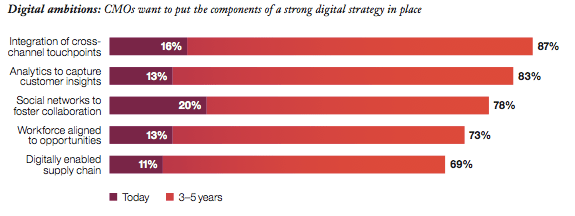
In this way, CMOs are way ahead of the pack in their adoption of digital strategies, technologies and platforms to achieve their key performance targets. CMOs embraced digital far earlier than other CxOs, which may explain why so many marketing solutions and mobile applications outperform their enterprise counterparts from other business units. So often marketing has better-designed, easier to use and more highly adopted apps precisely because the CMOs were out front on the importance of digital to their business unit.
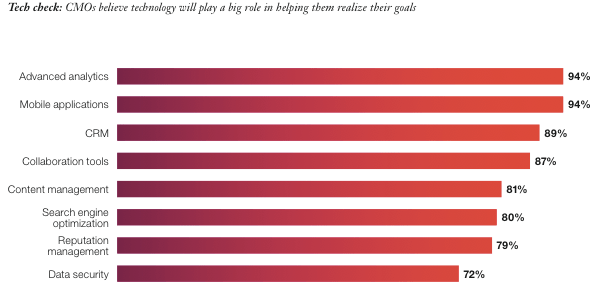
An overwhelming majority of CMOs see technology playing a major role within their business unit. The IBM survey really shows how far out in front CMOs are on this, and there’s a reason marketing apps are generally so much better than other enterprise applications.
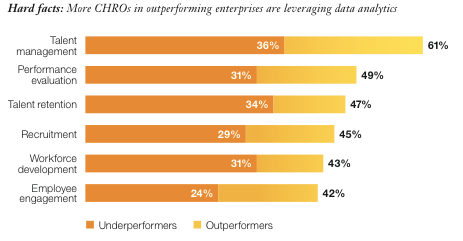
Chief Human Resource Officers are not far behind CMOs when it comes to leveraging technology to better do their jobs. For CHROs, it’s more about data analytics than strictly digital advancement. HR officers need the analytics digital technology can provide to better monitor their employees growth and performance, or to network and recruit great new talent.
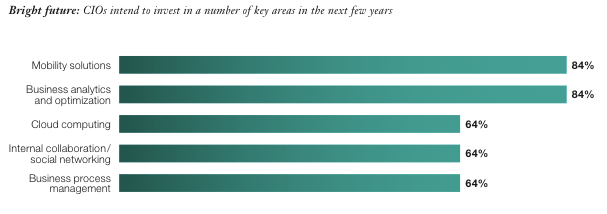
I doubt it surprised anyone that CIOs are chomping at the bit to invest their respective budgets on digital technologies — that is, after all, a huge part of their job. But the thing I found most interesting is the places where they plan on investing those dollars. A staggering percentage of CIOs will be investing in mobility solutions within the next five years. You simply cannot ignore 84 percent of all CIOs coming to that conclusion. Like CHROs, they also want the data and analytics that digital solutions can provide. Regardless, if you peruse the archives of the Copper Mobile blog, you’ll find articles addressing every single one of the issues within that graphic.
CxOs of all stripes recognize the significance of technology in shaping their business strategies of the future. But much of that technology will go toward one end — getting closer to their customers.
It’s about the customer, stupid!

It’s no surprise that C-suite executives affect business strategy more than any other stakeholder. They’re the ones actually making the decisions, so they see themselves as having the most power (which is almost certainly true). The thing most shocking about these statistics, though, is that CEOs see customers as wielding more strategic influence than the board of directors. That realization came as quite a shock to me. So many people say “the customer is always right,” but to actually believe that customers affect business strategy more than the board of directors has to be a major shift in thinking over the last few years. And, as the graphic on the left shows, that influence is only expected to grow over the next three to five years.
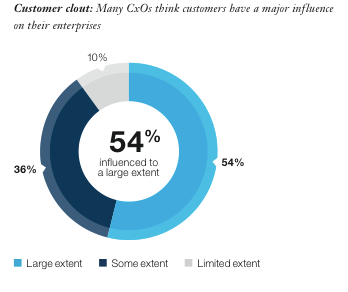
That belief isn’t unique to CEOs, though — a majority of all CxOs believe customers influence their enterprises to a large extent, with an additional 36 percent believing customers have at least some influence on their business.
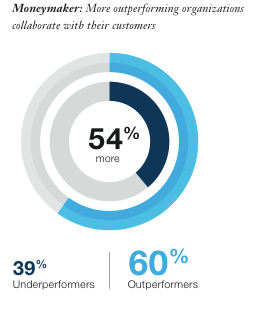
Most importantly, though, is that working with customers improves the bottom line. It’s tough to know exactly how IBM quantified “outperformers” in this context, but whatever the metric, 60 percent of those companies outperforming the market collaborated with their customers.
Working with your customers isn’t just about providing warm and fuzzy feelings, it’s about your bottom line. And if 60 percent of CxOs define their company as outperforming because of that collaboration, then you might want to take note.
All in all, this giant CxO survey yielded two main findings: CxOs across the board are embracing digital technology to great benefit, and one of the primary areas of focus within that development is customer interaction and engagement. By utilizing new technological tools to connect and collaborate with customers, enterprises large and small can start to improve their bottom lines. While the technology is certainly important, my take on James Carville still rings true:
It’s about the customer, stupid!






